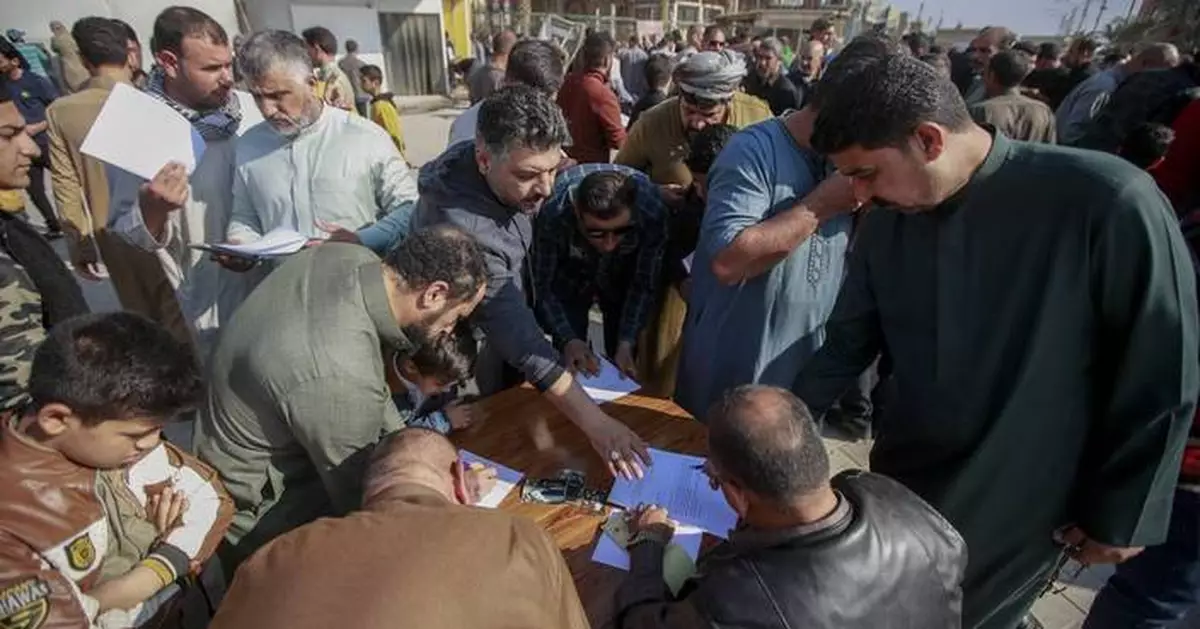BAGHDAD (AP) — Human rights groups and diplomats criticized a law that was quietly passed by the Iraqi parliament over the weekend that would impose heavy prison sentences on gay and transgender people.
U.S. State Department spokesperson Matthew Miller said in a statement that the law passed Saturday “threatens those most at risk in Iraqi society” and “can be used to hamper free-speech and expression.” He warned that the legislation could drive away foreign investment.
“International business coalitions have already indicated that such discrimination in Iraq will harm business and economic growth in the country,” the statement said.
British Foreign Secretary David Cameron called the law “dangerous and worrying.”
Although homosexuality is taboo in the largely conservative Iraqi society, and political leaders have periodically launched anti-LGBTQ+ campaigns, Iraq did not previously have a law that explicitly criminalized it.
The law passed Saturday with little notice as an amendment to the country’s existing anti-prostitution law. It imposes a sentence of 10 to 15 years for same-sex relations and a prison term of one to three years for people who undergo or perform gender-transition surgeries and for “intentional practice of effeminacy.”
It also bans any organization that promotes “sexual deviancy,” imposing a sentence of at least seven years and a fine of no less than 10 million dinars (about $7,600).
A previous draft version of the anti-prostitution law, which was ultimately not passed, would have allowed the death sentence to be imposed for same-sex relations.
Iraqi officials have defended the law as upholding societal values and portrayed criticisms of it as Western interference.
The acting Iraqi parliamentary speaker, Mohsen Al-Mandalawi, said in a statement that the vote was “a necessary step to protect the value structure of society” and to “protect our children from calls for moral depravity and homosexuality.”
Rasha Younes, a senior researcher with the LGBT Rights Program at Human Rights Watch, said the law’s passage “rubber-stamps Iraq’s appalling record of rights violations against LGBT people and is a serious blow to fundamental human rights, including the rights to freedom of expression and association, privacy, equality, and nondiscrimination.”
A report released by the organization in 2022 accused armed groups in Iraq of abducting, raping, torturing, and killing lesbian, gay, bisexual, and transgender people with impunity and the Iraqi government of failing to hold perpetrators accountable.
A group of Iraqi lawmakers said Sunday that they had launched a campaign to expel U.S. Ambassador Alina Romanowski, accusing her of interfering in the country’s internal affairs after she issued a statement condemning the legislation.
Iraqis interviewed Sunday expressed mixed views.
Baghdad resident Ahmed Mansour said he supports the legislation “because it follows the texts of the Quran and the Islamic religion by completely prohibiting this subject due to religious taboos.”
Hudhayfah Ali, another resident of Baghdad, said he is against it “because Iraq is a country of multiple sects and religions.”
"Iraq is a democratic country, so how can a law be passed against democracy and personal freedom?" he said.
Associated Press writer Ali Jabar in Baghdad contributed to this report.

FILE - Supporters of the Shiite cleric Muqtada al-Sadr sign a pledge to stand against homosexuality or LGBTQ, outside a mosque in Kufa, Iraq, Friday, Dec. 2, 2022. Human rights groups and diplomats criticized a law that was quietly passed by the Iraqi parliament over the weekend that would impose heavy prison sentences on gay and transgender people. (AP Photo/Anmar Khalil, File)
MADISON, Wis. (AP) — Smoke from Canadian wildfires has prompted health warnings across the Upper Midwest and Montana for the second year in a row.
Fires raging in British Columbia and Alberta have filled the skies with haze over parts of Montana, the Dakotas, Minnesota and Wisconsin on Sunday, lingering into Monday morning.
Unhealthy air pollution levels mean everyone in Minnesota should stay indoors and avoid heavy exertion outdoors, the Minnesota Pollution Control Agency said in its first statewide air quality alert of the season Sunday. Scheduled to end at noon Monday, the advisory was extended until 11 p.m. for southern Minnesota including the Twin Cities metro area.
The Wisconsin Department of Natural Resources said the air quality was unhealthy for sensitive people in multiple counties across the state's northern two-thirds on Sunday. Set to end at noon Monday, the advisories were kept in place until midnight.
Michigan's Upper Peninsula was also under hazy skies Monday. Some people reported the smell of smoke, said Joe Phillips, a National Weather Service meteorologist in Marquette, Michigan.
Prevailing winds could send the smoke south and east as far as Iowa and Chicago, leaving skies looking milky by late Tuesday or early Wednesday, said Rafal Ogorek, a meteorologist in the National Weather Service’s Chicago office. Most of the smoke was expected to linger over Minnesota, Wisconsin and northern Michigan, hanging between a mile (1.6 kilometers) and 2 miles (3 kilometers) above the ground.
A record number of wildfires in 2023 forced more than 235,000 people across Canada to evacuate and sent thick smoke into parts of the U.S., prompting hazy skies and health advisories in multiple U.S. cities.
There were 200 fires burning in Canada by mid-May last year, compared with 90 fires as of this Sunday, said Dave Phillips, senior climatologist at Environment and Climate Change Canada, a government environmental protection agency. A fire raging near Fort Nelson in British Columbia’s far northeastern corner has forced evacuations.
The chances of more wildfires this summer appear high. Lightning strikes could trigger fires that quickly spread in forests suffering intense drought in northeastern British Columbia, northwestern Alberta and the southern Northwest Territories, according the Canadian National Wildland Fire Situation report.
An analysis by World Weather Attribution, an initiative that aims to quickly evaluate the role of climate change in the aftermath of extreme weather events, found climate change more than doubled the chances of hot, dry weather that helped fuel the fire season.
Loretta Mickley, co-leader of Harvard University's Atmospheric Chemistry Modeling Group, said her group did papers in 2013 and 2015 looking at fire activity and ecosystems with an eye toward the future. She said increasing fire activity is consistent with a warming climate.
Drought conditions look to be less severe in Ontario and Quebec in the coming months, but temperatures are expected to be higher than normal, and it's difficult to predict if the moisture will cancel out the heat, she said.
“What will happen this summer? It depends on what the meteorology is like today and what happened over the winter,” she said. “In some regions a lot of rain in winter led to abundant vegetation. If that is followed by dryness or a drought then all that vegetation is ready to be burnt up and provide fuel to the fires.”
If Canada does see a repeat of last year's fire season, it's far from clear if the U.S. will get haze on the scale of 2023. Fires in Quebec and Ontario produced most of the smoke that enveloped The Eastern U.S. — but those regions rarely see such large fires. Instead of pushing the smoke west, the wind drove it south, covering the eastern quarter of the U.S. from the Mississippi River Valley to Manhattan with haze.
“It was an unfortunate, odd kind of weather pattern where you had winds encouraging that air to come south and then east,” said Phillips, of the Canadian environmental protection agency. “And it was just a shock to meteorologists, to the world and to everyone who had to endure it ... I think it will be a fraction of a concern as it was last year.”
Associated Press writers Rick Callahan in Indianapolis, Rob Gillies in Toronto and Steve Karnowski in St. Paul, Minnesota, contributed to this report.

Wildfire smoke hangs over the Minneapolis skyline on Monday, May 13, 2024. Winds pushed a band of heavy smoke south from fires burning in British Columbia, Canada, prompting officials in Minnesota to issue an air quality alert. (AP Photo:/Mark Vancleave)

The sunset is seen through a layer of wildfire smoke over Lakewood Cemetery in Minneapolis on Sunday, May 12, 2024. (Ben Hovland/Minnesota Public Radio via AP)

This photo provided by the Ministry of Water, Land and Resource Stewardship shows a wildfire, Aurora Borealis overhead, near Fort Nelson, British Columbia Saturday, May 11, 2024. An intense wildfire could hit a town in western Canada on Monday, based on forecasts of strong winds that have been fueling the out-of-control blaze which has already forced the evacuation of thousands, fire experts and officials warned. (Ministry of Water, Land and Resource Stewardship/The Canadian Press via AP)













